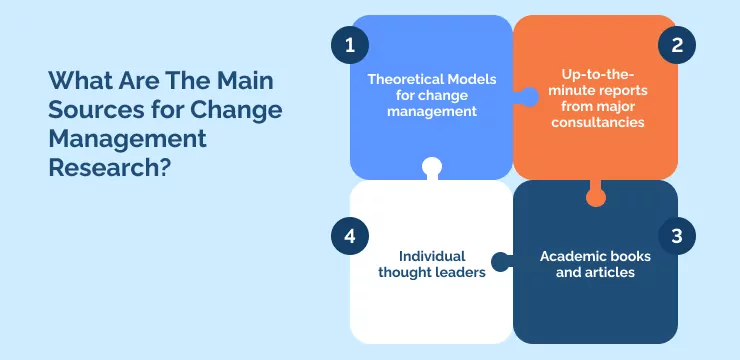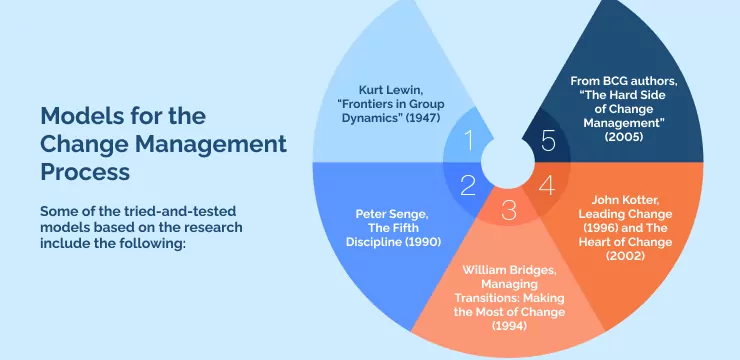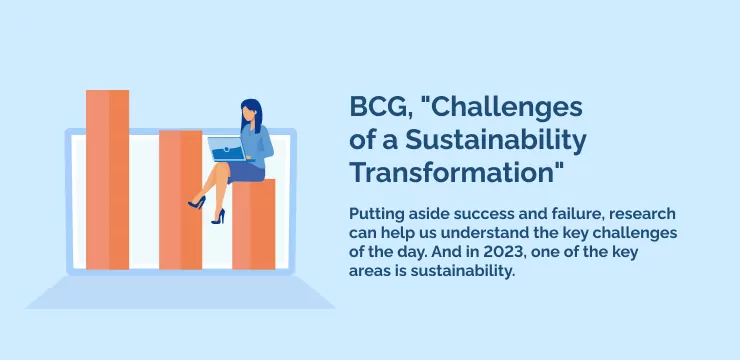
Why we all need Change Management Research
Some people out there already know everything they want to know about change management.
For the rest of us? Change management research is extremely useful. No matter your career stage, research gives you a broader perspective on the complex topic of organizational development. Research helps you see how change management works. And that process allows you to understand new ways to make change projects more successful.
The internet is your friend if you want to know more about change management. Countless resources are out there, claiming to improve your change management expertise. But how do you make a start with such a large body of work?
We’re here to help. In this article, we’ll briefly introduce change management research in 2023. We’ll start by explaining the formats change management research can take and the importance of reading change research. Then, we’ll explain some of the best ways of finding research. Finally, the article highlights some of the key pieces of research for 2023 and the coming years.
Reading this article can’t replace years of experience and education. But, by the time you’ve finished reading, you’ll understand how to start.
What Is Change Management Research?
If you’ve come this far, you already know what change management is.
And if there’s one thing you know about change management, implementing change is tough. We can’t say exactly how many change projects fail, although the 70% failure rate is probably a myth. But responsible leaders know the pitfalls – and do everything they can to prevent this from happening.
That’s where change management research comes in. Change management researchers analyze and evaluate every part of the organizational change process. Researchers in change management may look at corporate culture, communication strategies, leadership styles, and employee engagement. The findings from this research can support individuals who want to make the best change projects possible.
There are many different ways to study change management. Research on this topic might involve some of the following:
- Individual Case Studies
- Theoretical models
- Action research
- Trends and forecasting
- Quantitative analysis (profits, turnover)
- Qualitative analysis – interviews, focus groups,
- Longitudinal analysis
- Thought leadership
As we’ll see, finding change management research covering several of these areas is a good idea.
Why Is Change Management Research Important?

“Surely!” I hear business leaders cry out. “Can someone just tell me the best to do change management – and then we’ll do that?”
Unfortunately, it’s not quite as simple as that. Finding the best solution for each scenario takes sensitivity, experience, and knowledge. With change management research, we have many examples that have gone before us. We can learn from what’s worked and what hasn’t worked.
Trying to change in a changing world
The world creates new challenges for organizations every day. And the specific strategies for change projects change with them.
In the 1980s, McKinsey analyst Julien Philips understood his challenges for change projects very well. His classic article, “Enhancing the Effectiveness of organizational change management,” starts by explaining his working context. The challenges facing change projects in the US included deregulation, slower economic growth, foreign competition, and technological development.
In the 1980s, older models of organizational change were no longer enough. Already, Lewin’s famous strategies from the 1930s weren’t enough.
The same is true for us today. Perhaps we can learn from the history of change management. But no previous generation had to deal with the aftereffects of covid, the great resignation, or imminent climate catastrophe. In this situation, only research can help us to develop clearer visions of the future.
No need to reinvent the wheel
On the other hand – research gives us a solid base on which to make decisions. If someone’s done great work, they help every change leader create a better roadmap for the future. When you read the research, you’ll find new ideas for how to face challenges.
But good researchers go deeper into these questions. That might mean:
- They test data and statistics (do 70% of change projects fail?)
- They gather and compare different models
- They explore different industries
- They point out the flaws in other research.
In other words – researchers have done the hard work, so you don’t have to.
Each organization has similarities
Finally, we should mention one important assumption.
It’s worth reading research into change management because different organizations behave similarly.
No one’s claiming that two things are identical. But there’s a reason that we have models like Boston Consulting Group’s DICE framework, Kotter’s 8-Step process for change, or the Prosci ADKAR model. Change management teams understand that these methods connect with their real problems.
Such frameworks don’t pretend to capture the full complexity of an organization. They simply show that organizations can learn from one another.
So overall, research into change management is a bit of a paradox. On the one hand, the world is constantly changing, and nothing stays the same. On the other, we should assume that organizations do behave similarly.
What Are The Main Sources for Change Management Research?

Business research comes in many different shapes and sizes. That’s what makes it such an interesting field. Depending on what you need, you might want to read about:
- Theoretical Models for change management
- Up-to-the-minute reports from major consultancies
- Academic books and articles
- Individual thought leaders.
All of these sources have valuable ideas. So, in this section, we’ll look through these different categories and explain how they can add to your knowledge of change management.
By the way, we’ve already compiled a great list of change management reviews, journals, and blogs. Head over to the link if you’d like some more suggestions!
Models for the Change Management Process

Let’s start with the “big picture” research—the books that make you think differently about the nature of change itself. Whether or not these texts have got it right, we need to argue and wrestle with these generation-defining thinkers that make us see things differently.
Some of the tried-and-tested models based on the research include the following:
- Kurt Lewin, “Frontiers in Group Dynamics” (1947)
- Peter Senge, The Fifth Discipline (1990)
- William Bridges, Managing Transitions: Making the Most of Change (1994)
- John Kotter, Leading Change (1996) and The Heart of Change (2002)
- From BCG authors, “The Hard Side of Change Management” (2005)
These days, you’ll read plenty of articles claiming that there are five, eight, ten, or fifteen specific steps to complete a successful change project. The reality is there are several different ways of thinking about change. Reads these people thoroughly, and see what you think.
And if you want a bit more breadth? Palgrave has a Handbook of Organizational Change Thinkers (2018). It’s perfect if you want to see the most influential people in this field.
Academic books and journals.
The “big picture” books are great. However, they won’t keep you up to date on their own.
In universities worldwide, there are people whose WHOLE job is to produce research about change management. They write up their findings in journal articles and scholarly books. These publications go through peer review – in other words, the ideas have been more or less thoroughly tested.
For some ideas, take a browse through the following:
- Journal of Change Management
- Journal of Organizational Change Management
- People Management
- Academy of Management Journal
All of these journals publish excellent research from around the world.
However, when the world is changing very quickly, academic writing can still go quite slowly when the world is changing very quickly. Academic writing is still insufficient to keep your finger on the pulse of change management.
Reports from big consultancies
If you want to keep up to date with what’s happening in change management, you must stay in touch with the research outputs from big companies.
A regular stream of change management surveys, analysis, and thought leadership comes from major consultancies. Just check out the websites of McKinsey, Gartner, Kotter, BCG, and Deloitte, if you want to know more.
These consulting firms produce regular reports that offer insights, advice, and recommendations for change management. These reports can provide valuable and up-to-date research to help organizations address their most pressing needs, such as adapting to technological disruptions, creating a more agile organization, or building a culture of innovation.
However, be aware that consulting firms have their own biases and interests, which can influence their advice. It is important to critically evaluate the information provided by consulting firms and consider multiple sources before making decisions about change management strategies.
Individual thought leadership
Not so long ago, universities, publishers, and major organizations were the only ways to better understand change management.
In today’s digital world, the playing field is much broader. Individuals and small companies can all produce their own commentary on critical issues in management practices.
You can get excellent insights into change management from YouTube, LinkedIn, and Twitter.
Key Change Management Research for 2023
In 2023, change management will remain a vital area for businesses looking to stay competitive in a rapidly evolving landscape. In this final section, we’ve selected three key reports that will help you navigate the latest research and trends in this field,
These sources include the most recent McKinsey Global Survey, a BCG report on sustainability, and a crucial scholarly article on change management models. Collectively, these articles provide valuable insights and information to help improve your understanding of change management research in 2023 and beyond. Let’s dive in and explore these important resources.
McKinsey Global Surveys

The McKinsey Global Surveys are a series of research studies that change management. The latest set of results from 2021 is available on their website, with previous studies dating back to 2010, 2015, and 2017.
In McKinsey’s latest change management research, they found ways to get through the challenges of change projects. It’s common to hear that change management initiatives are difficult to execute. But McKinsey’s surveys show that positive outcomes can be achieved through iterative approaches to change. Moreover, successful projects managed to bring change processes into regular work routines. Everyone does better when briefings, target setting, and planning are regular parts of the work week.
The surveys also highlight three core factors contributing to success: conducting evidence-based assessments to identify improvement opportunities, adapting goals to suit employees at different levels, and deploying high-achieving staff to lead critical projects.
In 2023, this research remains a key source of information from one of the world’s leading management consultancies.
Understand the Past, and look to the future.
Do you remember what we said about not re-inventing the wheel? One article that does much useful work for us is “The Determinants of organizational change management success.”
This article is an easy way to become fluent in change management vocabulary and techniques. In their analysis of determining factors of success:
- They show us how to compare different models of change – including Lewin, Kotter, Mento, Cummings & Worsley)
- Draws attention to the different emphases in different models – whether on employees engagement, Management, or resistance
- Offers an extensive list of critical factors for success.
Once you read it, you’ll have an up-to-date overview of the possibilities. It’s a quick way to contribute better to ongoing leadership discussions about change management.
BCG, “Challenges of a Sustainability Transformation”

Putting aside success and failure, research can help us understand the key challenges of the day. And in 2023, one of the key areas is sustainability.
BCG has recently released a report titled “Challenges of a Sustainability Transformation.”
Written by prominent members of the BCG team, the report gives a fantastic overview of the issues in changing to an environmentally sustainable organization.
The report outlines the complex challenges of addressing sustainability across the supply chain. New solutions emerge rapidly, compliance requirements are becoming more strict, and securing funding within a business is still hard.
Drawing from their extensive insider knowledge, the authors provide insights into how organizations can effectively focus their change efforts and determine the best approach for implementing change. While the report is not comprehensive, it offers innovative ideas and strategies based on the authors’ experiences.
Managing Change with the Voice of Experience
To finish this article, let’s mention one thing very quietly. It’s this: there can be a downside to research. Research is a rabbit hole. Once you start reading, you can just go deeper and deeper. If you’re not careful, you can end up being indecisive. Perhaps you’ll try to make too many priorities. So, just make sure you select the insights that work for you.
As long as you don’t overdo it, there’s no harm in research. We’ve explained in this article how research can be important. We looked at some of the most important formats for change management research. And we took a little trip through some of the key research findings for 2023.There are plenty of resources for change management articles. Get started today, and see where the journey takes you.
WalkMe Team
WalkMe spearheaded the Digital Adoption Platform (DAP) for associations to use the maximum capacity of their advanced resources. Utilizing man-made consciousness, AI, and context-oriented direction, WalkMe adds a powerful UI layer to raise the computerized proficiency, everything being equal.



